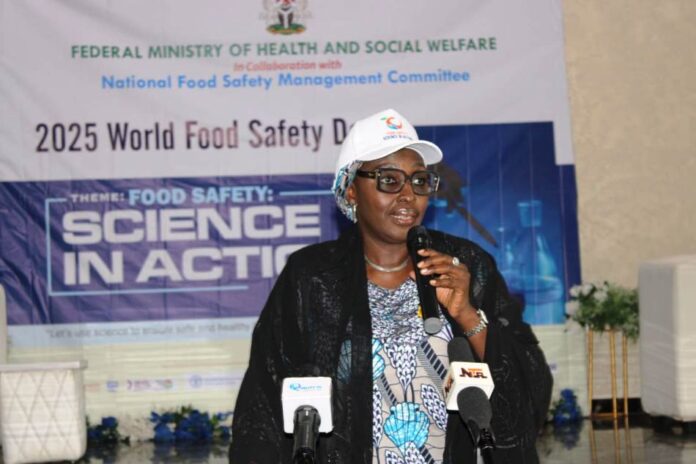
Abuja, Nigeria – The Federal Government, through the Federal Ministry of Health and Social Welfare, has reaffirmed its commitment to transforming Nigeria’s food safety system through a robust, science-driven strategy.
This was revealed by the Permanent Secretary, Federal Ministry of Health and Social Welfare, Daju Kachollom mni, as she delivered the keynote address of the 2025 World Food Safety Day celebration in Abuja on Monday.
Speaking under this year’s theme, “Food Safety: Science in Action,” Kachollom declared a new era of evidence-based food safety policy in Nigeria. She expressed “determined optimism” and underscored that science must no longer remain at the fringes of policy development but be the foundation upon which all regulatory and safety interventions are built.
“By harnessing cutting-edge research, risk assessment methodologies, and foodborne disease surveillance, we are building a resilient system that anticipates threats before they arise,” Kachollom stated. “This is not mere rhetoric. It is our blueprint for ensuring every meal in Nigeria is safe, healthy, and trustworthy.”
Continuing, the Permanent Secretary highlighted several milestone policies spearheaded by the Ministry, including the revised National Policy on Food Safety and Quality, the National Guideline for Sodium Reduction, and the National Guideline for Food Handlers’ Medical Test. She noted that these policies have already begun to reshape food industry practices and public health outcomes.
“These guidelines have set new benchmarks for consumer protection and hygiene standards,” she said. “They are not ends in themselves but stepping stones toward a safer and more responsive food system.”
She announced plans to scale up digital traceability systems and strengthen laboratory testing protocols: tools she said will give regulators and industry actors real-time insights into safety lapses and enable faster, targeted interventions.
The Permanent Secretary gave special attention to the Ministry’s newly activated Technical Working Groups (TWGs), which she described as “the engine rooms of Nigeria’s food safety future.” These TWGs are working across critical focus areas including risk-based regulation, traceability, food inspection, and science-based education to provide technical recommendations grounded in validated research.
“Every decision moving forward will be driven by data, peer-reviewed science, and verified field studies. This is how we’ll preempt food safety risks and not merely react to crises,” she said.
Looking ahead, Kachollom revealed the Ministry’s plans to invest in specialised training programmes for regulators and food safety professionals across Nigeria.
“We are building a new generation of experts scientifically equipped, technically sound, and deeply committed to safeguarding public health,” she declared.
The Permanent Secretary further made it clear that the country’s food safety framework must evolve continuously to meet both emerging risks and the technological advancements reshaping global food systems.
In a stirring call to action, Kachollom charged all pillars of Nigeria’s food ecosystem to embrace their roles in the transformation:
Researchers must drive innovation in surveillance tools and risk modeling;
Academic institutions must nurture food safety experts through multidisciplinary training;
The food industry must invest in technologies that combine safety with nutrition;
Regulators must stay ahead by adapting policies in line with new scientific evidence.
“United in purpose and driven by science, we can forge a food safety landscape that is future-ready, resilient, and inclusive,” she said.
In her opening remarks, Pharmacist Olubunmi Aribeana, Director Food and Drug Services Department of the Ministry stressed the collective responsibility required to maintain food safety across the entire supply chain.
“Food safety is everyone’s business from the farmer and processor to the retailer, transporter, and consumer. Each of us has a role to play by adhering to standards rooted in scientific evidence,” she said.
Speaking, Dr. John Atanda, Director and National Coordinator, Food Safety and Quality Programme of the Ministry, provided a sobering insight into the global burden of foodborne diseases.
“Globally, 600 million people fall ill from unsafe food each year and, low-and middle-income countries bear the brunt of this burden with over $110 billion lost annually due to productivity loss and healthcare costs,” he said.
Also, gratitude was also extended to development partners, international organizations, and local stakeholders whose continued support has been instrumental in advancing Nigeria’s food safety agenda.
The commemoration was spiced with goodwill messages delivered by collaborating MDAs which include Federal Ministries of Agriculture, Livestock Development, Environment and Industry Trade & Investment plus international partners.
This year’s World Food Safety Day served not only as a moment of reflection but also as a bold reaffirmation of Nigeria’s resolve to integrate science into the heart of food policy. As the nation looks to the future, the Federal Ministry of Health and Social Welfare has made it clear: food safety is a national priority and science is the engine that will drive it forward.
Signed
Alaba Balogun
Deputy Director
Information & Public Relations
16 June 2025





